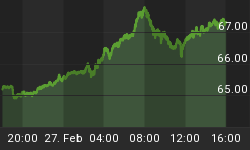
Special Guest: Jayant Bhandari is constantly traveling the world looking for investment opportunities, particularly in the natural resource sector. He advises institutional investors about his finds. Earlier, he worked for six years with US Global Investors (San Antonio, Texas), a boutique natural resource investment firm, and for one year with Casey Research. Before emigrating from India, he started and ran Indian subsidiary operations of two European companies. He still travels multiple times a year to India. He is an MBA from Manchester Business School (UK) and B. Engineering from SGSITS (India). He has written on political, economic and cultural issues for the Liberty magazine, the Mises Institute (USA), Mises Institute (Canada), Casey Research, International Man, Mining Journal, Zero Hedge, Lew Rockwell, the Dollar Vigilante, Fraser Institute, Le Québécois Libre, Mauldin Economics, Northern Miner, Mining Markets etc. He is a contributing editor of the Liberty magazine. He runs a yearly seminar in Vancouver titled Capitalism & Morality.
Financial Repression
"There are two parts of the world in my opinion. One is the western developed civilization and the other is the non-western civilization. The western civilization was primarily based on reason and respect for the individual. This has considerably deteriorated over the last few decades. Increasingly the coming of the police state in particularly the USA. In the West-European part of the western civilization the regulatory controls have become particularly horrendous as well. The welfare system of these economies is deteriorating these societies now. Culturally the western civilizations are increasingly on a slippery slope."
"The non Western civilizations have adopted the consumerism and wealth creating mechanism of the western civilizations, but I am not sure they have really adopted these things properly! Democracy has not done well in these countries. As a result consumerism is making these countries very unstable. The only countries I feel relatively positive about right now are China and some of the smaller countries like Singapore, Hong Kong, Mauritius - these countries are doing very well."

Hard Assets and natural Resources
The problem is with the investors who have over-funded mining. They shouldn't have ramped up mining as much as has been done!
'The places to invest are places like Canada, Scandinavia, Australia and parts of South America. You need consistency in the political climate. You want the stability for people to invest billions of dollars in these countries."
"I don't think global demand has fallen. If you look at Iron Ore the world is using three times more Iron Ore. The world requires three times more Iron Ore than it used to 10-15 years ago. What is changed is that we have started to supply more commodities than the world demand is there for it. The problem is with the investors who have over-funded mining. They shouldn't have ramped up mining as much as has been done!
Pervasive Global Over-Regulation
"Global western economies are stagnating and this is a direct result of over regulating business in those countries."
"Businesses are suffocating in the west now. There is pretty much zero growth. You need to understand the off balance sheet liabilities these businesses have, and continue to increase. They have benefited from technological evolution and the low hanging fruit over the last twenty years." This has now changed.
The US$ shows that though the US is deteriorating according to Jayant Bhandari "it is deteriorating slower than the rest of the world!"
"Economic repression is a fact of the day everywhere in the world"
Where growth is happening it is because of increasing consumerism and this is not good for the future because growth should be happening as a result of the increase in supply of products - which would mean we should be saving more - which would mean we should be producing more than we are consuming!"
Increasingly Bullish About Gold
"I have never been too bullish about gold but increasingly I am very bullish about gold. The reason is a lot of people misunderstand why Indians buy gold. The reason Indians and Chinese buy so much gold is that for example in India the yield on investment is negative. It pays them to invest in something that gives them positive real yield. In my view India is going to increase its consumption of gold and the Chinese will keep doing it."
"Once the US$ becomes too over-valued people will begin putting their money in precious metals!"
.... and much more in the video interview. Listen to the whole interview.















